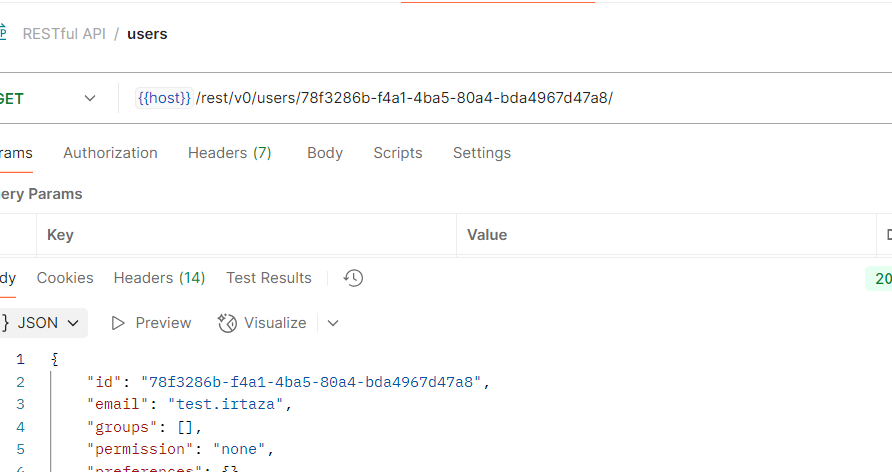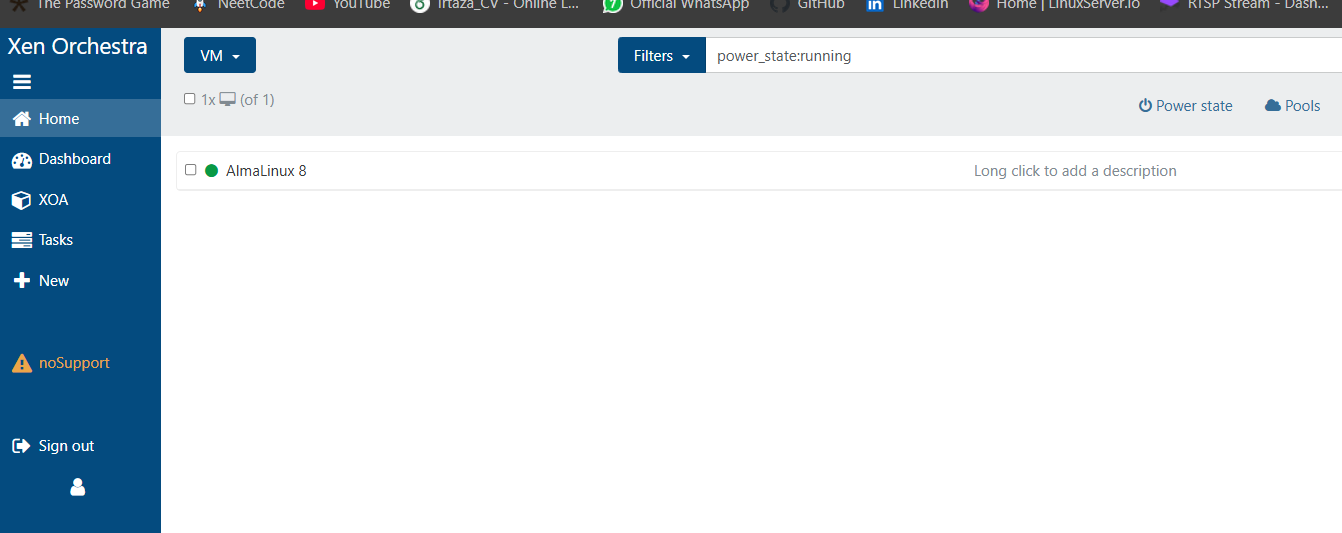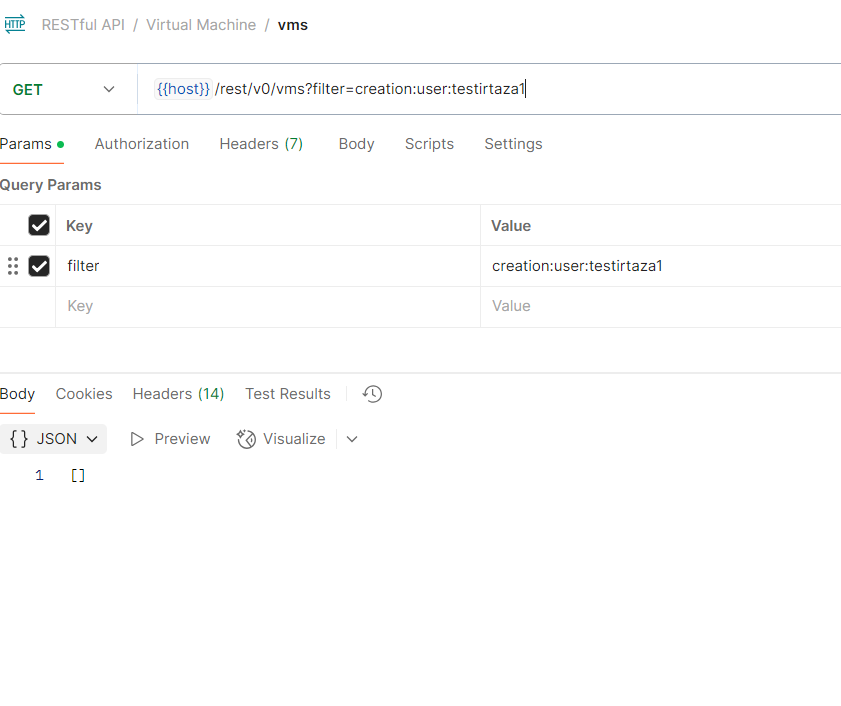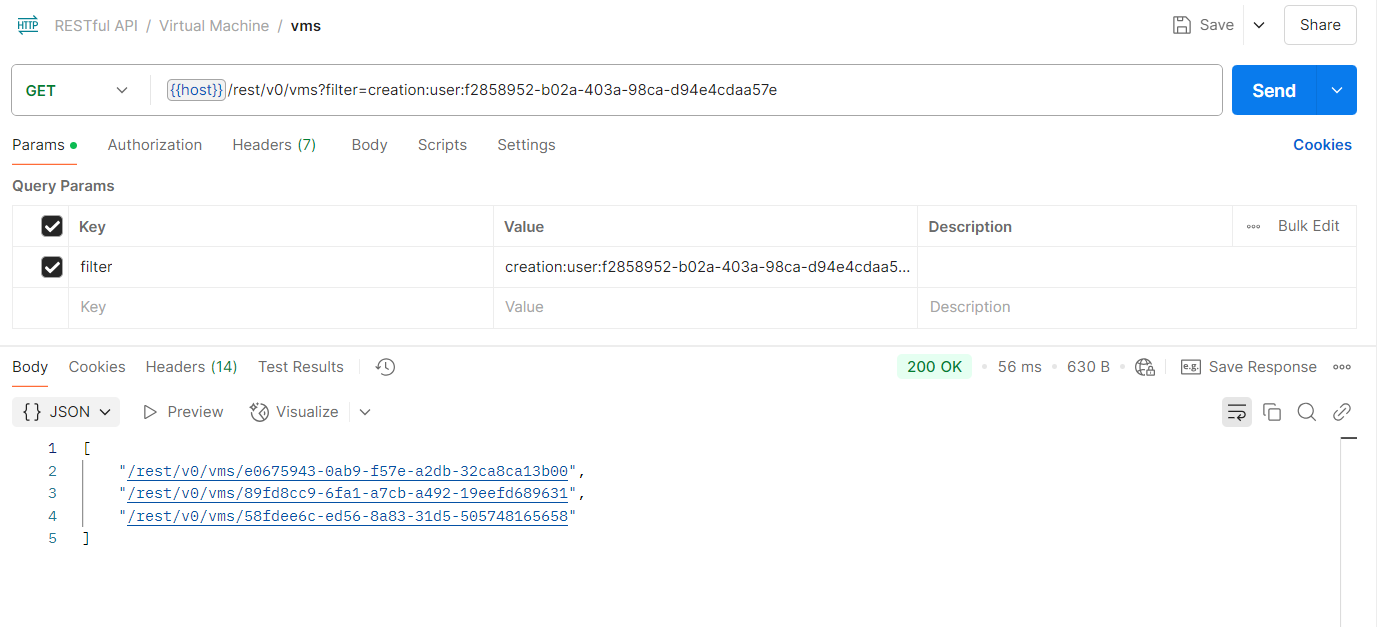User specific data
-
I want to retrieve user data by calling an API using an admin API token for all requests. With this token, I want to fetch data for individual users that I have created on XO.
Token: Admin privileges
Medium: REST APIs
Users: User1, User2I want to pass the username of the desired user and receive their corresponding data in the response.
-
Hi,
Pinging @MathieuRA
-
@irtaza9 What have you tried? Do you have the token already generated?
Here's an example of retrieving user information generated from Postman --
curl --location '192.168.1.xx/rest/v0/users/3b480e98-af4e-4dbf-xxxx-29ac59d6364f' \ --header 'Cookie: authenticationToken=Xqi6ERHsu7I9-xxxx-joJ-tYogiXhPZgM06lioO3EGo'{ "id": "3b480e98-af4e-4dbf-xxxx-29ac59d6364f", "email": "admin@admin.net", "groups": [], "permission": "admin", "preferences": { "filters": { "VM": { "> 2 snapshots": "snapshots:length:>2", "Autostart Off": "!other:auto_poweron:\"true\" ", "Deletion blocked": "blockedOperations:destroy:true", "< 2GB memory": "memory:size:<2147483648", "No HA": "high_availability:\"\"", "Windows VMs": "os_version:name: windows", "Backup Group": "power_state:running tags:/^backup$/", "UEFI firmware": "boot:firmware:uefi" }, "host": { "More than 10 running VMs": "residentVms:length:>10", "Reboot required": "rebootRequired?" }, "SR": { "Hide UDEV": "!\"SR_type\":\"udev\"" } }, "defaultHomeFilters": { "SR": "Hide UDEV" }, "sshKeys": [ { "title": "xxx@gmail.com", "key": "ssh-ed25519 xxx+6+DL+WUPZT1L xxx@gmail.com" } ] }, "authentication_tokens_href": "/rest/v0/users/3b480e98-af4e-4dbf-9f1e-29ac59d6364f/authentication_tokens", "groups_href": "/rest/v0/users/3b480e98-af4e-4dbf-9f1e-29ac59d6364f/groups" } -
This is not what I'm looking for,
/usersendpoint will give you info about the users but I want to extract the vms of the user by using admin token. If you need more info, I will provide you.
-
@irtaza9 Yes, I suggest that you provide a better description of what you want to achieve because I read your original post as wanting to retrieve information of specific users ("corresponding data"), not pulling a list of VMs associated with a user ("extract the vms of the user").
Please explain how the VMs are tied to a specific user or group. How are you identifying this in XO?
-
rn in XO each user can create VMs. When user logged In to the XO he see the list of vms or he uses the token then he fetches the vms via apis. But In my case I want to fetch the vms of other users by using the admin account token.
I have created a resource group in self service and add newly created user to that resource group.

login as
test.irtaza: I created a vm in that resource set.
Now I want to fetch the vms of
test.irtazaby using the token of admin account. -
So you want to retrieve information related to the Self Service portal, correct?
he uses the token then he fetches the vms via apis.
Can you elaborate on this? What specific API is the user calling to retrieve this information?
-
@Danp yes we are testing self service.
Can you elaborate on this? What specific API is the user calling to retrieve this information?
we want to retrieve and perform these > vm list, vm stats, console, actions etc
we do not want to using each user token to access their objects. we want a single point to get the data
-
@irtaza9 I'm not sure if this is currently possible with the REST API.
-
@Danp said in User specific data:
currently possible with the REST API.
can we do this using JSON-RPC?
-
@irtaza9 Yes, I imagine that is what XO is using. Calling
resourceSet.getwill return an array of objects associated with the resource set as well as an array of subjects (users / groups). -
I have two users
test.irtaza,testirtaza1in a resource set namedcustomer. And when login any of the account this is the output ofresourceSet.getAlllogin via
test.irtaza{ "id": -9007199254740984, "jsonrpc": "2.0", "result": [ { "id": "V7Gr0uoqGwE", "ipPools": [], "limits": { "cpus": { "usage": 1 }, "disk": { "usage": 10737418240 }, "memory": { "usage": 4294967296 }, "vms": { "usage": 1 } }, "name": "customer", "objects": [ "d4515c45-71ca-7675-ea70-0fe0a8f7dbe4-7aa32be8-a06c-4ade-8a1d-49e51e03e9d2", "d4515c45-71ca-7675-ea70-0fe0a8f7dbe4-09d6b4cc-dd4b-4619-aacb-01576ccd5b0f", "20e6d987-f8cb-d1b6-2b49-744a87358ae3", "ca780b00-fd77-4a2a-fbb2-6f2859e6b4a7" ], "subjects": [ "78f3286b-f4a1-4ba5-80a4-bda4967d47a8" ], "shareByDefault": false, "tags": [] } ] }login via
testirtaza1{ "id": -9007199254740984, "jsonrpc": "2.0", "result": [ { "id": "V7Gr0uoqGwE", "ipPools": [], "limits": { "cpus": { "usage": 2 }, "disk": { "usage": 21474836480 }, "memory": { "usage": 8589934592 }, "vms": { "usage": 2 } }, "name": "customer", "objects": [ "d4515c45-71ca-7675-ea70-0fe0a8f7dbe4-7aa32be8-a06c-4ade-8a1d-49e51e03e9d2", "d4515c45-71ca-7675-ea70-0fe0a8f7dbe4-09d6b4cc-dd4b-4619-aacb-01576ccd5b0f", "20e6d987-f8cb-d1b6-2b49-744a87358ae3", "ca780b00-fd77-4a2a-fbb2-6f2859e6b4a7" ], "subjects": [ "78f3286b-f4a1-4ba5-80a4-bda4967d47a8", "f2858952-b02a-403a-98ca-d94e4cdaa57e" ], "shareByDefault": false, "tags": [] } ] }is the
array of subjectsare the users andarray of objectsare those things which thesesubjectshave access on?Also
session.signInmethod returns the id of user{ "id": -9007199254740991, "jsonrpc": "2.0", "result": { "id": "f2858952-b02a-403a-98ca-d94e4cdaa57e", "email": "testirtaza1", "groups": [], "permission": "none", "preferences": {} } }and,
acl.getCurrentPermissionsmethod returns those things which belongs to the current loggedIn user?to call
acl.getCurrentPermissionsmethod we have signin by the user credentials(username,password/token){ "id": -9007199254740711, "jsonrpc": "2.0", "result": { "58fdee6c-ed56-8a83-31d5-505748165658": { "view": 1, "operate": 1, "administrate": 1 }, "89fd8cc9-6fa1-a7cb-a492-19eefd689631": { "view": 1, "operate": 1, "administrate": 1 } } }means I have to create the user first then store these credentials at my space so that I can call
acl.getCurrentPermissionsmethod and get his VM's and then list those vm's to my portal and allow him to manage their vms from my custom built portal? Is my thinking is correct? -
-
Hi @irtaza9
FYI, for about 2 years, VMs expose acreationfield:"creation": { "date": string, "template": string, "user": string },With this you can filter VMs by
creation.userto list only VMs created by a user.
/rest/v0/vms?filter=creation:user:<user-id> -
you saved my life bro, thank you so much. I got the right way.
-
Is your issue solved @irtaza9 ?
-
@MathieuRA endpoint is not returning vms created by user but that user have vms and it's shown in XO when login by testirtaza1 user.

-
@irtaza9 you need to use the user-id, not the username
-
user-id
bg: when you call
session.signInyou get the user-id and that id is used to fetch user specific vms.{ "id": -9007199254740991, "jsonrpc": "2.0", "result": { "id": "f2858952-b02a-403a-98ca-d94e4cdaa57e", "email": "testirtaza1", "groups": [], "permission": "none", "preferences": {} } }
@olivierlambert yes, issue is resolved. Thanks to @MathieuRA and @Danp

-
 O olivierlambert marked this topic as a question on
O olivierlambert marked this topic as a question on
-
 O olivierlambert has marked this topic as solved on
O olivierlambert has marked this topic as solved on